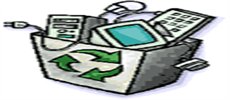WASTE MANAGEMENT IN EUROPE
The European Union through a number of directives contribute to preventing
waste and promoting recycling by informing consumers, by supporting
research and technological development of new, more environmentally
friendly goods and ways of promoting products and services using fewer
resources [11].
The objective of the European Union is to reduce waste disposal by 20%
compared with 2000 to 2010 and by 50% by 2050.
The European Union is acting in accordance with four key principles:
• The principle of prevention: reduction of waste from the source (reducing
toxic waste. For example, reduced heavy metals in batteries.), And encourage
industry to produce and consumers to choose products and services-that
create less waste . Also, developing and promoting a pan-European strategy
for the recycling of waste.
• The principle "polluter pays": those who cause pollution
should cover the cost of that settlement. Accordingly, the substances
must be identified and that producers are responsible for collecting,
processing and recycling of their residues.
• The precautionary principle: where there is a potential risk, should
be made to prevent it.
• the proximity principle: settlement of waste as close as possible
to its source.
ALTERNATIVE WASTE MANAGEMENT IN GREECE
The new legislative framework for waste [9]
The way waste management is changing now and in Greece as a result
of the new legal framework adopted. Key elements of this framework
include:
- Law 2939 / 6-8-2001 «Measures and conditions for the alternative
management of packaging and other products» and the relevant Presidential
Decrees, including incorporating into national law the directives
62/94 «on packaging and waste Packaging », Directive 96/2002 on the«
management of electrical and electronic waste - WEEE »and Directive
95/2002 on the« elimination of hazardous materials - ROHS ".
- The Joint Ministerial Decision 29407 / 3508/16-12-02 «conditions
and measures for the landfill» including incorporating into national
law Directive 31/99 «on Landfill».
The new legal framework requires the implementation of a comprehensive
effort in our country for prevention, recovery, reuse, recycle.
Besides the strategic objectives of the legislation] and the PD, In
particular the objectives [9] on waste electrical and electronic equipment
(WEEE) are:
• Prevention of waste from the management of electrical and electronic
equipment, reducing the total volume and hazardous ingredients and
build on:
• the principle of priority of the reuse of electrical and electronic
equipment, materials recovery and recycling of WEEE and then
• recover energy without pollution of the environment in accordance
with the legislation to reduce the disposal of such waste.
• Reduction and elimination of hazardous substances contained in waste
electrical and electronic equipment in the design and construction
(lead, mercury, cadmium, hexavalent chromium, polybrominated (PBB)
or polybrominated (PBDE)).
• Encourage new device design to facilitate reuse and recycling.
• Recovery AIIS least 4 kg per person per year. The recovery - reuse
and recycling should be done by certified and licensed processes.
A proper solution to the problem and recycling is considered in this
context in January 2003 adopted a European directive which obliges
the countries of the community to recycle 4 kg of electronic and electrical
waste per person each year until the end of 2006. However, as the
head office of Greenpeace [12]. in Greece, Nikos Charalambides, «bet
on Greece seems particularly difficult, since we managed to recycle
just 0.01 kilos per person».


